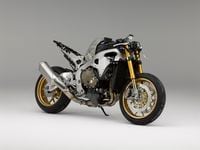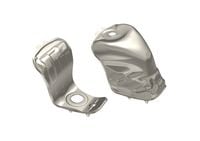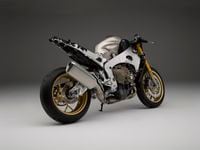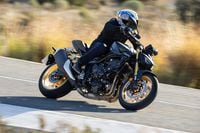What did you get for your last birthday? If you're the 2017 Honda CBR1000RR Fireblade SP and you're celebrating the big 25 then you got more power, less weight, traction control, ABS, a quickshifter that works in both directions, and a whole bunch of other trick new stuff culled from the RC213V-S (click here for Zack Courts' Onboard Video at Valencia Circuit aboard the RC213V-S). You also got some news for your birthday: You have a more athletic twin brother you never knew about, in this case a "homologation special" CBR1000RR SP2.
Let’s start with some metrics. The CBR1000RR SP’s two big measures of performance have both moved in desirable directions. The SP’s wet weight has dropped from a claimed 441 pounds without ABS to just 430 pounds with ABS. Meanwhile, power is said to have received a 10-horsepower bump. The last CBR1000RR SP we tested made 152 hp on our dyno, so this bike is likely to put down a solid 160 at the rear wheel. Honda says the CBR’s power-to-weight ratio was improved by 14 percent. Not too shabby!
So where’d those extra 10 ponies come from? Power was increased using a number of established strategies. New pistons (that bump the compression ratio from 12.3:1 to 13.0:1) put more squeeze on the intake charge to help bolster midrange power while new DLC-coated piston rings reduce friction and improve cylinder sealing. Shorter, slash-cut intake trumpets with bigger 48mm bores flow more air at high engine speeds, while revised cam timing helps produce more top-end power. Topping it all off is a higher redline, up 750 rpm from 12,250 to 13,000 rpm. The engine also gets a slip-and-grip clutch and lightweight magnesium case covers.
Reducing weight was a huge focus for the 2017 bike, and Honda went all-out pinching grams on everything from the new full-color TFT dash on down to the aluminum wheel spacers. The frame uses thinner sections to save weight and a new subframe and swingarm cut nearly 2.5 pounds, while the generous use of titanium cuts the exhaust system’s mass by over 6 pounds. Speaking of titanium, the CBR’s tank is made out of the stuff, shedding another 3 or so pounds. The tank is also over an inch narrower between your knees, making the bike feel quite a bit more compact.
Other parts that went on a diet include the wheels (a few ounces lighter), bodywork (it’s narrow, and there’s less of it), radiator (over an inch narrower and thus lighter), and battery (it’s a lithium-ion unit instead of a heavy lead-acid unit). Not only do these parts weigh less, they’re also for the most part located at the bike’s periphery, which means they’ll have a bigger affect on handling.
Historically Honda hasn’t been keen to jump on the electronics bandwagon, but after debuting a bunch of incredible rider aids on the ultra-exotic RC213V-S, Big Red saw fit to bestow some of those goodies on the new CBR. Ride-by-wire throttle control and a 5-axis IMU open the door to race-grade multi-level traction control, wheelie control, slide control, and cornering ABS. There’s even a quickshifter that works in both directions. The rider interfaces with all these new features through new switchgear and a beautiful new dash with a customizaton display.
The previous SP had Öhlins suspension, but this latest SP get’s the Swedish company’s top-shelf electronically adjustable pieces. No more fiddling with adjusters—just dial in the desired setting through the dash. Better yet, this semi-active system adjusts compression and rebound damping as you ride for the best handling possible.
It's been 5 years since the CBR has seen a serious update 2012, but Honda is making up for lost time, just like Suzuki with the new-for-2017 GSX-R1000. [Link to GSX-R story] This latest SP's spec sheet reads as sweetly as the best of the best (we're looking at you, Yamaha YZF-R1M), but is it an R1-beater? We won't know until we ride the thing. Honda says bikes will be in dealerships in March or April of 2017, and while pricing hasn't been nailed down Honda suggested that the CBR1000RRSP would be "under $20,000."
And there’s more. Honda also released news of a CBR1000RR SP2, a limited-production machine created purely for racing homologation. The SP2 will have bigger intake and exhaust valves and forged-aluminum Marchesini wheels, plus Honda is offering special kit parts. That bike is supposed to cost around $25,000, but good luck getting one. Honda said they’re only making 500 over the next two years. Only a handful will come to the US, and most of those will be reserved for race teams.











/cloudfront-us-east-1.images.arcpublishing.com/octane/VV4J66V6LLCDTDGSOC7PQCQXQA.jpg)



/cloudfront-us-east-1.images.arcpublishing.com/octane/QSTCM6AVEZA5JJBUXNIQ3DSOF4.jpg)
/cloudfront-us-east-1.images.arcpublishing.com/octane/U4I7G625B5DMLF2DVIJDFZVV6M.jpg)
/cloudfront-us-east-1.images.arcpublishing.com/octane/B6XD6LS6IVCQPIU6HXDJSM3FHY.jpg)
/cloudfront-us-east-1.images.arcpublishing.com/octane/ICL63FEDDRDTTMINYICCEYGMDA.jpg)
/cloudfront-us-east-1.images.arcpublishing.com/octane/FCGZHQXRBZFLBAPC5SDIQLVF4I.jpg)
/cloudfront-us-east-1.images.arcpublishing.com/octane/WNOB6LDOIFFHJKPSVIWDYUGOPM.jpg)

/cloudfront-us-east-1.images.arcpublishing.com/octane/X33NU3E525ECRHXLNUJN2FTRKI.jpg)
/cloudfront-us-east-1.images.arcpublishing.com/octane/6KKT5NNL2JAVBOXMZYS5ZO76YA.jpg)
/cloudfront-us-east-1.images.arcpublishing.com/octane/J5RKG5O455GMPGQRF2OG6LRT7A.jpg)
/cloudfront-us-east-1.images.arcpublishing.com/octane/GX2CIZKQVRH2TATDM26KFG2DAE.jpg)
/cloudfront-us-east-1.images.arcpublishing.com/octane/ZWIDYSAKQZHD5BHREMQILXJCGM.jpg)
/cloudfront-us-east-1.images.arcpublishing.com/octane/CYUHJZCTSJCH3MRAQEIKXK7SCQ.jpg)
/cloudfront-us-east-1.images.arcpublishing.com/octane/LKOFINY56FCXJCANJ5M7ZDQUBY.jpg)
/cloudfront-us-east-1.images.arcpublishing.com/octane/4NBPDACMWJH63JQYJVK3QRBDZI.jpg)
/cloudfront-us-east-1.images.arcpublishing.com/octane/KKHQHRR3FJGX7H2IPU6RALMWG4.jpg)

/cloudfront-us-east-1.images.arcpublishing.com/octane/5IOFS5JAE5FOXMNA23ZRAVVYUU.jpg)
/cloudfront-us-east-1.images.arcpublishing.com/octane/CGXQ3O2VVJF7PGTYR3QICTLDLM.jpg)

/cloudfront-us-east-1.images.arcpublishing.com/octane/OQVCJOABCFC5NBEF2KIGRCV3XA.jpg)
/cloudfront-us-east-1.images.arcpublishing.com/octane/OPVQ7R4EFNCLRDPSQT4FBZCS2A.jpg)
/cloudfront-us-east-1.images.arcpublishing.com/octane/YBPFZBTAS5FJJBKOWC57QGEFDM.jpg)
/cloudfront-us-east-1.images.arcpublishing.com/octane/W5DVCJVUQVHZTN2DNYLI2UYW5U.jpg)